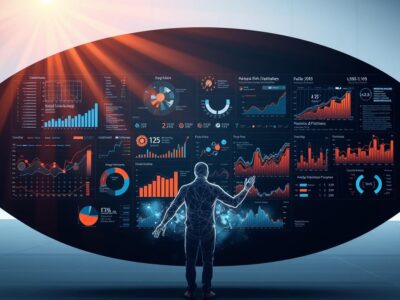CEOs are now focusing on AI-powered lead generation to double their sales-qualified leads quickly. The use of Artificial Intelligence in sales is changing how companies automate lead generation. It makes marketing efforts more targeted, efficient, and successful.
Leading this change are tools like HubSpot and Salesforce Einstein. They offer dynamic solutions that change how marketers plan their campaigns. With AI, sales processes become smoother and conversion rates go up. This is due to AI’s ability to predict customer behavior, customize content, and sharpen marketing strategies. This could increase revenue by 10% to 15%.
While adopting an AI lead generation strategy comes with its own set of challenges, the advantages are significant. Marketers now have access to tools for predictive analytics and AI-based transcription like Riverside or Turboscribe. These tools help improve every part of generating leads. AI also helps analyze buyer behaviors in real-time, connecting business offerings to customer needs more effectively.
To see how AI can boost your B2B sales, explore the best AI lead generation tools. They can help you on this revolutionary path.
Key Takeaways
- AI lead generation greatly improves sales pipelines, helping businesses achieve their efficiency and conversion targets.
- AI tools like HubSpot, Salesforce Einstein, and Drift help marketers use automation to their benefit.
- Predictive analytics and CRM integration are key in creating a successful AI lead generation strategy.
- AI tools are crucial for addressing challenges in roles such as marketing analytics.
- AI-powered lead generation allows for personalized customer engagement, increasing conversion chances.
- Data-driven AI solutions provide insights into customer behavior and preferences, helping to overcome common objections.
Understanding AI Lead Generation
In today’s fast-changing sales and marketing world, artificial intelligence lead generation is changing the game. It helps businesses find and keep potential customers better and faster. By using AI, companies make their operations more efficient and tailor their conversations to fit what their prospects want and like.
What is AI Lead Generation?
Lead generation with AI uses smart algorithms and machine learning to make finding potential customers easier and better. These technologies can look through huge amounts of data to find the best leads. This means businesses can focus their efforts where they count the most.
Key Components of AI in Sales
The power of AI lead generation tools comes from things like machine learning and natural language processing. These components help AI understand patterns and talk to leads in a more human way. AI takes care of scoring leads, collecting data, and talking to customers first, making these steps faster and more accurate.
How AI is Changing Sales Dynamics
As AI gets smarter, it’s having a bigger effect on how we sell. AI tools make work easier and ensure every customer chat is tailored and on time. With AI doing the routine tasks, sales teams can do more important work. This improves how much they sell and how fast they sell it.
AI lead generation tools are not just for finding leads. They also talk to leads everywhere, help customers any time, and change messages to suit each lead. This makes AI a must-have for modern ways to find leads.
Here’s how top AI tools help find business-to-business (B2B) leads, according to the latest reports:
| Feature | AI Tool Example | Impact on Lead Generation |
|---|---|---|
| 24/7 Lead Engagement | Chatbots on Messenger Platforms | Chats with many leads at once, making people happier and more likely to respond. |
| Real-time Lead Scoring | Jasper.ai | Scores leads as they interact, making it easier to know who to talk to first. |
| Email Personalization | Copilot AI | Makes emails that talk directly to what leads like and do, automatically. |
| Outbound Automation | Artisan with Ava | Takes over sending messages out, so teams can focus on bigger ideas and talking to people. |
Using artificial intelligence lead generation makes finding the right leads more exact. It also makes B2B marketing strategies more active and able to talk across many places at once.
Benefits of Implementing AI in Lead Generation
Today, businesses are focusing on growth and better interactions with potential clients. Using a AI lead generation strategy offers clear benefits over old methods. We will see how automated lead generation with AI makes sales more efficient, targeted, and cost-effective.
Increased Efficiency and Productivity
Now, 76% of companies use automation. AI lead generation software helps by automating tasks. This includes gathering data, answering questions in real-time, and setting up follow-ups. These tasks let sales teams put more effort into important strategies rather than boring tasks.
Because of this, productivity and efficiency go up. Clearly, automation changes how sales teams work for the better.
Enhanced Targeting and Personalization
AI is great at understanding customer data. It creates detailed customer profiles. It looks at how users act and personalizes messages to them. This leads to more sales.
With better targeting, marketing is not wasted on those not interested. This is something old lead methods struggle with.
Cost-Effectiveness Compared to Traditional Methods
Adding AI saves money too. Companies say AI cuts down on manual work and costs. Advanced AI tools like looking ahead and working with CRM help with lead steps. This lowers the money spent on getting and keeping leads.

Also, an AI lead generation strategy means you can analyze data and adjust marketing fast. This makes spending more efficient. Companies using AI get a better view of their ROI. They understand how well each campaign works thanks to data.
In the end, using AI lead generation software not only improves the lead process. It helps achieve bigger business goals. This leads to a sales team that is more flexible and quick to respond.
AI Tools and Technologies for Lead Generation
Businesses are turning more to digital ways of working, and AI in lead generation is at the heart. This tech improves how companies find and talk to possible customers. It makes getting leads better and improves the quality of talks. This ensures companies focus on the right prospects.
Popular AI Tools in the Market
HubSpot, Salesforce Einstein, and LinkedIn Sales Navigator are key players in AI lead generation. They use AI to better engage leads and increase sales. HubSpot, for example, combines AI with its CRM to make work smoother and boost customer talks.
Meet Alfred and Smartwriter AI bring something new to the table. Meet Alfred helps with LinkedIn leads through a cloud service. Smartwriter AI offers tailored email tips for better communication.
Then there are tools like Skyline Social and Customers.AI, each with its unique features. Customers.AI targets people who visit websites without leaving info. Skyline Social has an AI assistant to improve lead generation strategies.
Features to Look for in AI Lead Generation Tools
When picking AI lead generation software, certain features matter a lot:
- Predictive Lead Scoring: These tools use analytics to tell which leads might convert, helping sales teams focus on the best opportunities.
- Data Mining Capabilities: Good AI tools can quickly look through big data sets to find useful patterns, making lead sorting faster.
- Integration and Scalability: The top AI tools work well with other tech and can grow with a business, protecting the investment.
- Real-Time Data Tracking: In fast-changing markets, businesses benefit from AI lead generation that provides instant insights. This lets them adjust strategies quickly.
To sum up, understanding and using AI lead generation tools well can greatly boost sales efficiency and ROI. Through automated customization, thorough data analysis, or strategic outreach, AI lead generation transforms possible market chances into real business success.
Best Practices for Using AI in Lead Generation
To get the best out of AI in lead generation, it’s crucial to integrate it smoothly into sales processes. This also means giving sales teams the right training. Doing so makes everything more effective.
Integrating AI with Existing Sales Processes
Integrating AI for lead generation needs smart use of tools like HubSpot and Salesforce. These tools sync well with CRM systems. This helps in automating and personalizing lead outreach.
By using AI tools, companies can make better use of data. This improves their lead generation work as a whole.
- Improved Personalization: With generative AI, content made for each lead can boost engagement and conversions.
- Enhanced Efficiency: AI helps in organizing leads better, making marketing more focused.
- Dynamic Content Generation: AI creates content that’s just right for every user, raising the chances of a sale.
Training Your Team to Utilize AI Effectively
For AI lead generation to work well, ongoing team training is essential. The world of AI keeps changing. Regular training keeps the sales team savvy about the latest in AI. Plus, having AI enthusiasts in the team can motivate others to use AI smartly.
It’s also smart to use expert AI lead strategies. These recommend training programs that match real-life sales situations.

- Hands-on Workshops: These sessions help sales teams get better at using AI in areas like lead scoring and improving sales talks.
- Custom Learning Paths: Tailored learning experiences make sure sales staff really understand how to blend AI into their day-to-day tasks.
Embracing these methods means making the most of AI in finding leads. It also creates a culture that’s always ready for the next big thing in tech. This leads to ongoing improvement and success.
Measuring Success: KPIs for AI Lead Generation
Using AI for lead generation is more than just setting it up. It’s vital to measure its impact accurately and always. Focusing on the right KPIs for AI lead generation is crucial for businesses. By understanding these KPIs, companies can align AI with their main business goals.
Key Performance Indicators to Track
Several KPIs are key to evaluating AI’s effectiveness in generating leads. Metrics like lead scoring accuracy, which can improve lead conversion rates by 10-20%, are important. By tracking the average landing page conversion rates, typically around 9.7%, businesses get insights into how well AI campaigns are doing.
It’s also wise to keep an eye on Customer Lifetime Value (CLV) and Cost Per Acquisition (CPA). These metrics shed light on the financial benefits and efficiency of using AI for generating demand.
Analyzing the Data for Insights
Analyzing AI-led data means looking deeper than the basic numbers. This deep dive helps improve strategies and the effectiveness of AI models. As a result, businesses can achieve better AI lead generation results. Metrics such as campaign ROI are crucial for understanding AI strategies’ profitability.
Other important metrics include error rates, bias detection, and data quality scores. These ensure that AI systems are both effective and dependable in real-world use.
| Metric | Description | Impact on AI Lead Generation |
|---|---|---|
| Lead Scoring Accuracy | Accuracy of ranking leads according to conversion likelihood | Improves conversion rates by 10-20% |
| Average Landing Page Conversion Rate | Percentage of visitors who complete a desired action | AI-driven campaigns often exceed the 9.7% average |
| Customer Lifetime Value (CLV) | Projected revenue a customer will generate during their relationship | Increased notably with AI utilization |
| Cost Per Acquisition (CPA) | Total cost to acquire a new customer | AI should lower CPA over time |
| Campaign ROI | Return on investment for specific campaigns | Determined by direct revenue impact of AI-driven campaigns |
For more insights and data on the right KPIs, check out articles like this lead generation metrics guide. It offers thorough advice on selecting, calculating, and monitoring the critical metrics. This helps businesses effectively measure and refine their AI lead generation strategy.
Common Challenges in AI Lead Generation
Using AI for lead generation brings big benefits. Yet, many businesses face challenges that slow them down. To move past these hurdles, it’s vital to use smart strategies and solutions. This helps in making the most of AI to change the way sales work.
Data Quality and Integration Issues
Keeping data accurate is a big challenge in AI lead generation. Wrong or old data can badly impact AI’s work. For example, UserGems shows that databases can be 6-9 months behind. This makes the data useless. It’s crucial to clean data well and use trusted third-party data to make AI better.
Also, when adding AI to old systems, data integration AI problems can pop up. An API-focused method is needed for smooth functioning and connection.
Overcoming Resistance to Change within Teams
Resistance from the team is another big issue. Doubts about new tech and worry about job loss can stop AI from being accepted. Keeping everyone in the loop about what AI does and its good points can help. Showing that AI tools like chatbots can support, not replace, people is key to getting everyone on board.
To make AI work well, it’s important to tackle issues like how it fits into the company. Here, we talk about common problems and smart ways to solve them. This can make data and team issues better:
| Challenge | Strategic Solution |
|---|---|
| Data Quality Concerns | Implement data governance policies and employ continuous monitoring to ensure data accuracy and relevancy. |
| Integration Complexities | Adopt an API-centric approach that ensures compatibility and collaboration between AI tools and existing IT infrastructure. |
| Team Resistance | Organize workshops and training sessions to demonstrate AI’s practical benefits and its role in augmenting human capabilities. |
| Scalability Issues | Ensure AI solutions are scalable to adapt with growing data volumes and evolving business needs. |
By tackling these AI lead generation challenges, companies can boost efficiency and stay ahead in the market.
The Future of AI in Lead Generation
The digital world is always changing, and so are AI lead generation methods. Businesses see big improvements in how they find and keep customers. For instance, a SaaS company saw leads convert 50% better. A major retailer kept 30% more customers with tailored promotions. It’s clear, AI in sales is changing things now.
AI is also getting better at predicting which leads will pan out. It’s starting to use cool tech like VR and AR. This means customers get really unique experiences. Businesses using AI now are getting ready for these changes. They’re improving customer services and staying ahead in the market.
Trends to Watch in AI Technology
Predictive analytics and automated marketing are already making leads better. Upcoming trends point to more personalized and engaging methods. TikTok shows how AI can make content that people love. This leads to viral posts and great leads. AI also helps in analyzing how well strategies work in real time. This makes plans more adaptable and successful.
Preparing Your Business for the Future of Sales AI
Getting ready for AI’s future means more than just new tools. It’s about embracing change and innovation. To effectively use AI in lead generation, align your marketing with the latest trends. Use social media insights and try out AR/VR to attract customers. It’s crucial to see how AI can make recommendations more personal and work with influencers. By doing this, businesses can lead in customer engagement and be ready for new AI advancements.
FAQ
What is AI Lead Generation?
AI lead generation uses artificial intelligence to find and attract potential customers. This process is automated with machine learning, data analytics, and smart algorithms. They make finding new customers faster and smarter.
What are the Key Components of AI in Sales?
Key AI components in sales include machine learning for spotting trends. Predictive analytics forecast customer actions. Natural language processing helps talk with people. And, CRM systems integration streamlines sales.
How is AI Changing Sales Dynamics?
AI changes sales by personalizing campaigns and automating lead tasks. It also gives salespeople data insights. This optimizes sales and boosts conversions.
What are the Benefits of Implementing AI in Lead Generation?
Implementing AI boosts efficiency and targets marketing better. It also saves money over old methods. This leads to faster sales and more conversions.
What Popular AI Tools are Available in the Market?
Popular tools include HubSpot, Salesforce Einstein, LinkedIn Sales Navigator, and Drift. They offer unique ways to automate and improve lead generation and sales.
What Features Should You Look for in AI Lead Generation Tools?
In choosing AI tools, look for predictive lead scoring and data analysis skills. Also check for natural language processing, easy CRM integration, and real-time insights.
How Can AI be Integrated with Existing Sales Processes?
Integrate AI by picking tools that match your team’s needs and connect with current systems. This might need custom setup and IT team help for smooth operation.
How Can Your Team be Trained to Utilize AI Effectively?
Train your team through hands-on workshops, online courses, and ongoing learning. Having AI leaders in the team boosts AI use and benefits.
What Key Performance Indicators Should You Track for AI Lead Generation?
Track AI lead generation’s success by conversion rates, click-through rates, and ROI. These KPIs show how well AI campaigns work.
How Can You Analyze the Data for Insights?
Use AI software to study customer actions and sales funnel performance. This helps refine strategies for better results.
What Are Common Data Quality and Integration Issues in AI Lead Generation?
Issues include bad data that confuses AI. Plus, AI tools may clash with current systems, hurting workflow and data accuracy.
How Can You Overcome Resistance to Change within Teams?
Beat resistance by showing AI’s benefits, training well, and using success stories. A culture of learning and innovation helps too.
What Trends Should Your Business Watch in AI Technology?
Watch for trends like conversational AI’s rise, better predictive scoring, and AI in multi-channel marketing. Knowing these helps use AI in lead generation.
How Can Your Business Prepare for the Future of Sales AI?
Prepare by investing in current AI, fostering innovation, and training in AI advances. Being flexible with new AI trends keeps businesses competitive.



